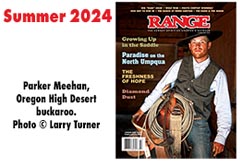

 |
 |
| . | ||||
Conservationists believe in the wise multiple use of natural resources. As the new administration settles in and refines its domestic land-use agenda for the next four years, hereās one conservationistās view of the highest priorities. First, keep private land private. Private property is critical to the conservation of natural resources in America, but only 60 percent of the country is still in private hands. Stanch the bleeding and establish a federal policy of ćno net loss of private property.ä The Constitution prohibits the taking of private property for public use without just compensation. Nominate judges who understand that when government takes the use of property, it takes the property. Underscore this, like Oregon recently did, by legislating payment at fair market value when land is devalued by land-use restrictions. Establish land-asset leasing as the method of choice when government wants to take the biological, historical or visual assets of private property for public use. Land ownership stays in the family; the land isnāt lost from the tax rolls; itās less expensive than condemnation; it avoids unconstitutional regulatory takings. Repeal the death tax. Itās bad for families, bad for communities, bad for conservation, and bad for America. Land-trust abuse of the death tax has already sucked the lifeblood out of too many rural families. Drive a stake in the heart of this perverse practice, permanently. Reward water conservation on private land. Especially where water is scarce, provide tax incentives for landowners who conserve water for public benefit through good land management. Save endangered species and wetlands. Some 75 to 90 percent of all U.S. endangered species have habitat on private property. Stop giving landowners an incentive to destroy habitat like the Endangered Species Act does, and reward landowners who protect it. Lease habitat at fair market value, and mandate a zero-tax policy on private property where habitat exists. When government pays for the land it takes, habitat will stop being destroyed and start being created. The same is true for wetlands. Fix conservation easements. Require land trusts to make full disclosure to families, limit how long easements are valid, and require easement holders to make up the difference in taxes that are lost to local communities. Rural America depends on property taxes to finance everything from health care to education. Make land trusts pay for the damage they do to the rural tax base. Stop environmental espionage. Prohibit the collection of environmental, scenic and historic preservation data on private property without the landownerās knowledge and written consent. Where government collects the data, mandate data confidentiality like Texas does. On the public lands, legislatively reestablish ćwise multiple useä as federal land-use policy. Like Teddy Roosevelt, promote mining, logging, grazing and water development on the public domain through the lease and sale of natural resource rights at fair market value. Develop Americaās energy resources. Thank the environmentalists for their opinion and aggressively move ahead. Drill for oil and gas wherever it occurs, including the Alaska National Wildlife Refuge and the continental shelf. Mine for coal and oil shale, and rejuvenate Americaās nuclear industry. Mitigate environmental impacts to the extent practicable, but donāt let the tail wag the dog. Give people back their access to the public domain. Environmentalists donāt own the public lands; the people do. Reopen the road networks on Americaās parks and protected areas, and expand peopleās access to their property. Increase local control over public land-use policy. Before authorizing any policy, require the concurrence of the local communities that are most affected. Where it makes sense, turn over management of public lands to local entities like Texas is doing. Shield federal highway funding from linkage to environmental land-use initiatives. Federal gasoline taxes should go to maintain highway infrastructure, not force states to swallow crackpot ideas like ćsmart growth.ä Stop giving environmentalists a free lunch. Systematically scrutinize the activities of tax-free environmental groups, and withdraw tax protection from those who engage in partisan politics or other disqualifying practices. That aināt everything, of course. But, like the lawyer buried up to his neck in sand, itās a good start. N Jeff Goodson is president of JW Goodson Associates, Inc., a Texas property consulting company. He is a regular contributor to RANGE.
|
|
© 1998-2005 RANGE magazine. All rights reserved. | For reprints, permissions or general questions, contact RANGE |
|
Brought to you by RANGE magazine |